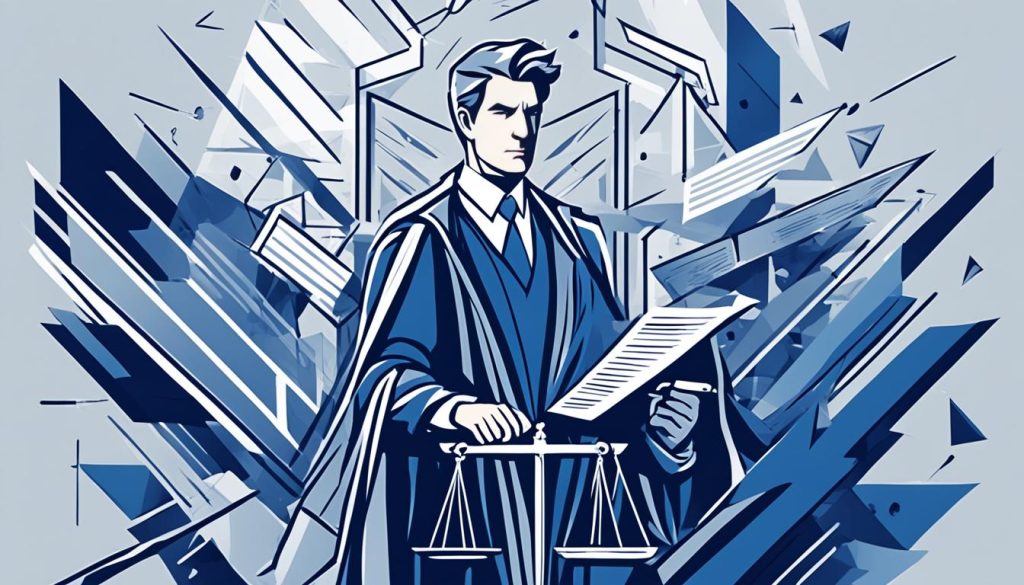In the U.S. criminal justice system, probation and parole are key alternatives to jail time. They help people understand their legal options. This can guide them through the legal process and show possible ways to move forward.
Probation is a way for the court to supervise someone instead of sending them to jail. It’s given to people who have been convicted of crimes1. In California, probation for felonies can last from three to five years1. For smaller crimes, it’s called summary probation and the court oversees it1. Probation officers check if people follow the rules, which might include paying back victims, doing community service, or drug tests1.
Parole lets people get out of prison early if they meet certain conditions1. It’s a chance for early freedom. To get parole, people usually need to behave well and take part in rehab programs1. Parole comes with rules like police checks, registering with authorities, and doing tasks related to their crime1. Breaking these rules can mean going back to prison for the rest of their sentence1.
Key Takeaways
- Probation is a form of court-ordered supervision that serves as an alternative to imprisonment, often granted to individuals convicted of criminal offenses.
- Parole is a means of supervised release from prison, granted to eligible individuals before the completion of their full sentence.
- Formal probation in California typically lasts three to five years for individuals convicted of felonies, while summary probation is common for misdemeanor offenses.
- Probation officers closely monitor those on formal probation to ensure compliance with the terms and conditions.
- Parole conditions may include law enforcement searches, registration with local authorities, and offense-related requirements based on the nature of the crime.
Probation: An Alternative to Incarceration
Probation lets people who have committed crimes stay out of jail and follow strict rules instead. It helps them change their ways and take responsibility for what they did2. People who have committed serious crimes like murder or drug trafficking usually can’t get parole3. A judge might give probation instead of jail time or along with some jail time.
Types of Probation in California
4 In Florida, some people get probation if they’re not seen as a big risk to others and have done well for half of their probation4. For serious crimes or repeat offenders, there’s community control probation, which means more rules and watching over them4. Drug offender probation is strict, for those who have committed drug-related felonies, and includes drug tests and job requirements4. Mental health probation focuses on helping people with mental illnesses through treatment and taking their meds4. Sex offender probation is very strict, with lots of supervision, treatment, and rules to follow.
Terms and Conditions of Probation
3 Being on probation or parole means you have to follow the law, stay away from alcohol, and let your parole officer visit you2. Your home can be searched without a warrant3. Breaking the rules can lead to fines, losing your probation, or even jail time2. You might also have to go to rehab, take drug tests, or find a job.
4 In Florida, breaking probation rules is either technical (not following the rules) or substantive (committing a new crime)4. Probation is cheaper than jail and helps reduce crime rates.
“Probation is a legal arrangement that allows individuals convicted of crimes to avoid incarceration and instead reintegrate into society under strict supervision.”
Parole: Supervised Release from Prison
Parole lets people leave prison early if they agree to follow certain rules and complete their sentence under supervision5. It started replacing parole for federal crimes after November 1, 19876. The longest time you can be on supervised release is five years, but some serious crimes can extend it5.
Eligibility Criteria and the Parole Process
To get parole, you need to earn good time credit and take part in rehab programs5. Most federal defendants get supervised release56. A parole board checks if you’re eligible and if you’re safe for the community.
Supervision and Conditions of Parole
While on parole, a parole officer checks you follow the rules like agreeing to searches and registering with the authorities56. You also have to follow specific rules for your crime and report to a probation officer5. Breaking these rules can mean going back to prison5.
Parole used to be part of your sentence, but supervised release is after you’ve served your full time5. About 72.9% of federal defendants get supervised release6. These rules can last a long time, but they can change or you might be released after a year6.
| Eligibility Criteria | Supervision and Conditions |
|---|---|
|
|
“Parole is a privilege, not a right. It is a conditional release that allows an individual to serve the remainder of their sentence outside of prison, provided they adhere to strict guidelines and supervision.”
If you break the rules of parole, you could go back to prison5. The court might add more time to your sentence if you don’t follow the rules5.
Critical Differences Between Probation and Parole
Understanding the difference between probation and parole is key in the criminal justice system. Probation is given instead of jail time for those convicted of lesser crimes7. It comes with rules like meeting with a probation officer, drug tests, doing community service, or going to rehab7. Parole, however, is when a prisoner is released early if they behave well and show they’ve changed for the better7.
Probation is set by judges, while parole is decided by a parole board7. With probation, you don’t go to jail unless you break the rules7. Parole is for those who have been in prison for a while and are seen as ready to live in society again7.
If you break the rules of probation or parole, you could face more jail time or even lose your freedom7. Both probation and parole aim to help people change their ways and keep society safe. They have their own rules and ways of working7.
In places like Colorado, probation lets people serve their time outside of jail if they follow certain rules8. Parole is when someone is released from prison early to finish their sentence at home8. Probation can be part of a sentence or an alternative to jail, with tasks like drug tests and mental health care8. Who gets parole depends on the crime, sentence length, and past criminal history8.
In Virginia, most felony crimes come with probation, supervised or not, with different rules9. Getting parole in Virginia is up to the Parole Board, based on how well you’ve behaved and if you’re ready to be out9. Some crimes, like first-degree murder, have strict sentences with no parole option9.
Dealing with probation and parole can be tough. It’s wise to talk to a criminal lawyer who knows the laws in your area789.
Navigating the Legal Maze with Professional Help
Probation or parole can be complex and scary. Legal counsel is key to help you. Lessem Newstat & Tooson, LLP in Los Angeles, is an expert in probation violation and parole suitability. Their defense attorneys offer specific advice to help you understand court orders and your legal options10.
Dealing with probation or parole can be tough. But, you don’t have to go it alone. A professional legal team can explain your rights and the possible outcomes. Lessem Newstat & Tooson, LLP can help with probation violation or parole suitability, making sure your rights are protected10.
Understanding the criminal justice system is hard. But, a skilled defense attorney can help you make smart choices. Lessem Newstat & Tooson, LLP knows a lot about probation and parole. They can fight for your rights and aim for the best outcome for you10.

Don’t tackle probation or parole by yourself. Turn to Lessem Newstat & Tooson, LLP, a reliable law firm in Los Angeles. Their defense attorneys offer the help and support you need to get through the legal system and protect your rights10.
probation, parole, criminal justice, legal terms
Understanding the criminal justice system can feel overwhelming. But knowing the legal terms can help you make better choices. Probation and parole are key parts of the system. They offer ways to avoid jail and help people return to society11.
Probation lets people stay in their communities but under supervision12. Who gets probation depends on the crime, how well they can be helped, and if they fit into community supervision12. Those on probation must follow rules like meeting with officers, passing drug tests, and staying away from certain places or people12.
Parole is when a prisoner gets released early, but only if they meet certain conditions11. The decision is based on the crime, how the inmate behaved in jail, and the safety of the public11. Parolees also have strict rules, like seeing officers, taking drug tests, and not moving around freely or hanging out with certain people11.
Both probation and parole have rules that explain who can get them and how they work1112. Breaking these rules can lead to warnings, new rules, or even going back to jail1112.
Knowing the differences between probation and parole is key for those in the criminal justice system1112. Both focus on helping people change and giving them a chance to live outside jail. But they have different ways of doing this11.
When dealing with legal matters, it’s important to understand probation and parole well. Getting advice from lawyers can help you or your loved ones. They can explain the options and guide you towards choices that help with rehabilitation, getting back into the community, and keeping everyone safe11122.
Conclusion
Probation and parole are key parts of the criminal justice system in the U.S. They help with rehabilitation and reintegration of offenders. Knowing the difference between them helps you understand court orders better. This lets you make smart choices and see your options13.
Now, there’s a move towards a more supportive approach in community supervision. This change is important for successful reintegration and lowering supervision revocation rates13. Also, the high costs of jail and the limited success of probation and parole show we need new ways to supervise communities14.
If you’re dealing with probation, parole, or other legal issues, getting help from experts is key. They can guide you through the system and help you reach your goals. With their help, you can understand your rights and options. This way, you can make choices that help you succeed in life and fit back into society. 1314,
FAQ
What is the difference between probation and parole?
Probation means you don’t go to jail but are still watched over. Parole is for after you’ve been in jail. Probation helps change bad habits and keeps you accountable. Parole helps you get back into society smoothly.
What are the types of probation in California?
In California, there are two kinds of probation. One is for serious crimes and the other for smaller ones. You might have to pay back money, do community service, take drug tests, or go to counseling.
How does an individual become eligible for parole?
To get parole, you need to behave well and take part in rehab programs. A parole board will then decide if you’re ready to be released with supervision.
What are the conditions of parole supervision?
On parole, you’ll have a supervisor who checks you follow the rules. This includes letting them search you without a warrant, registering with them, and following specific rules for your crime. Breaking these rules can send you back to jail.
When should I seek legal counsel for probation or parole-related matters?
Getting legal help is smart if you’re confused about probation or parole. A lawyer can explain things to you and help you make the best choices for your situation.

